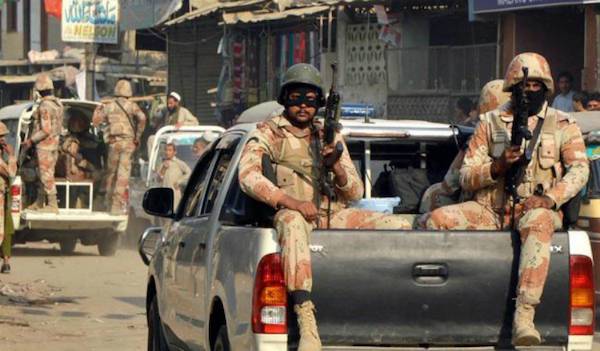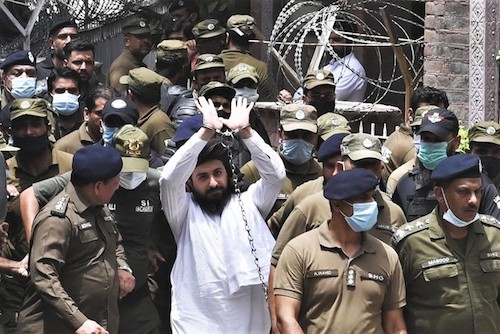Baton wielding protesters, emotionally charged crowds, struggling law enforcement agencies, scared and inconvenienced normal-day individuals, impending signs of causalities welcome to another saga of surrender of the state to the group it had recently declared a terrorist outfit! Lest we forget, this is not the first time. Numerous governments in the past have faced the same predicament and done almost exactly the same thing lose their spine in the face of aggression. “Cometh the hour, cometh the man”, the adage it seems is correct! Some examples? The PPP government vs. the cadres of the Tehrik-e-Minhajul Quran (TMQ) of Tahirul Qadri, the PML(N) government vs. the TLP of Khadim Hussain Rizvi and now the PTI government vs. the TLP of Saad Hussain Rizvi.
| Surely this crisis will abate by hook or by crook. But we must ask ourselves, should we hold our collective breaths for the next one? |
For the recent iteration after the proscribed TLP threatened to storm the capital and two policemen were killed in Lahore, the Interior Minister said that the government had accepted all their demands. He not only praised TLP leaders but also released the miscreants involved in rioting and killing of law enforcement officials. All this bending-over-backwards for a group that had been barred earlier this year! And now it seemed that the government was planning to backtrack from this ban, though in due course it may have to choose the proverbial stick more forcefully than the axiomatic carrot!
Like the past, a mutual way forward of sorts has been charted and the current situation diffused a tactical resolution as opposed to a strategic way out. But is there a long-term answer to this difficult scenario? Possibly, but it is not easy. Consider.
| To get the nation behind the state, the state must be more transparent in such circumstances. |
Governments and especially Prime Ministers and Presidents have a difficult balancing act. They need to ensure that they govern for the whole population and not only for those to the left or right of the political spectrum. This is not easy! The doctrine of the leader of the government notwithstanding, each political party has a certain affinity to the left or right, something that it can’t overlook. Afterall, that is the actual philosophy, the DNA, of the party. In the present climate, the PTI government’s policy of encouraging overt religiosity may have played right into the hands of the extreme right organisations. The nexus of the two has meant that the country is now seeing a more violent shape of fanaticism. To be clear, this has been happening with previous governments as well! To counter that, political parties particularly those in government will need to move more towards the centre and not allow themselves to be seen to do anyone’s bidding.
Next, enforcing the writ and rights of the state must be paramount. But this doesn’t come without its own baggage because no rights can be claimed if responsibilities can’t be met. If a government doesn’t fulfill its part of the bargain of executing its responsibilities in an efficient fashion, then how can it be expected its writ and rights to be enforced? Part II of the Constitution of Pakistan (CoP) aptly titled, “Fundamental Rights and Principles of Policy” gives clear guidance of the responsibility of the state towards its citizens. Governments must talk about this responsibility first before they talk about writ. Though, in drastic circumstances the state’s responsibility of providing security to its citizens against foreign and domestic opponents must trump everything else.
| Numerous governments in the past have faced the same predicament and done almost exactly the same thing lose their spine in the face of aggression. |
Subsequently, much work needs to be done in the capacity and capability building of respective law enforcement agencies (LEAs). With the advent of technology and social media, patrolling the streets alone is not enough to stave off agitations and riots. What must be kept in mind is that capacity and capability carry two different meanings. In the context of transformation, capacity building refers to absorbing change and having the bandwidth to learn new skills and capability building denotes the skills and knowledge required to do a particular task. In the situation nowadays confronting LEAs, they probably have the capacity to change and learn but lack the capabilities needed to be successful in the face of changing security threats. A good corollary of such a capacity and capability enhancing programme would be to have able and efficient frontline LEAs while relegating the often used Rangers really as an enforcer of last resort.

Lastly, if and when negotiating with proscribed groups and elements detriment to the state, any agreement reached must be transparent and available generally. This will show accountability and the fact that the general populace will know where the blame lies when one of the two parties reneges on their actions. In the present predicament while the Interior Minister initially said that all the TLP demands were met, he didn’t elaborate further or show what those actually were or how they were agreed to. To get the nation behind the state, the state must be more transparent in such circumstances.
The remedy is not easy. It is a mix of short term and long-term actions. Surely this crisis will abate by hook or by crook. But we must ask ourselves, should we hold our collective breaths for the next one? Should we wait until we feel the brunt personally? Should we allow the many to be held hostage by the few? Should we demand more from our state? Food for thought indeed, but let’s not take too long!




